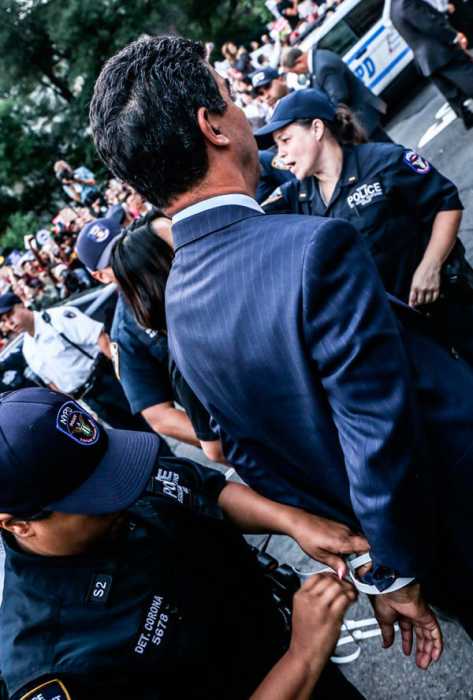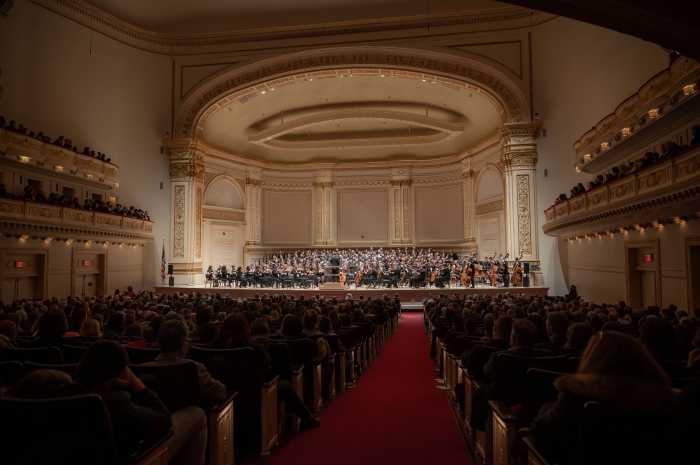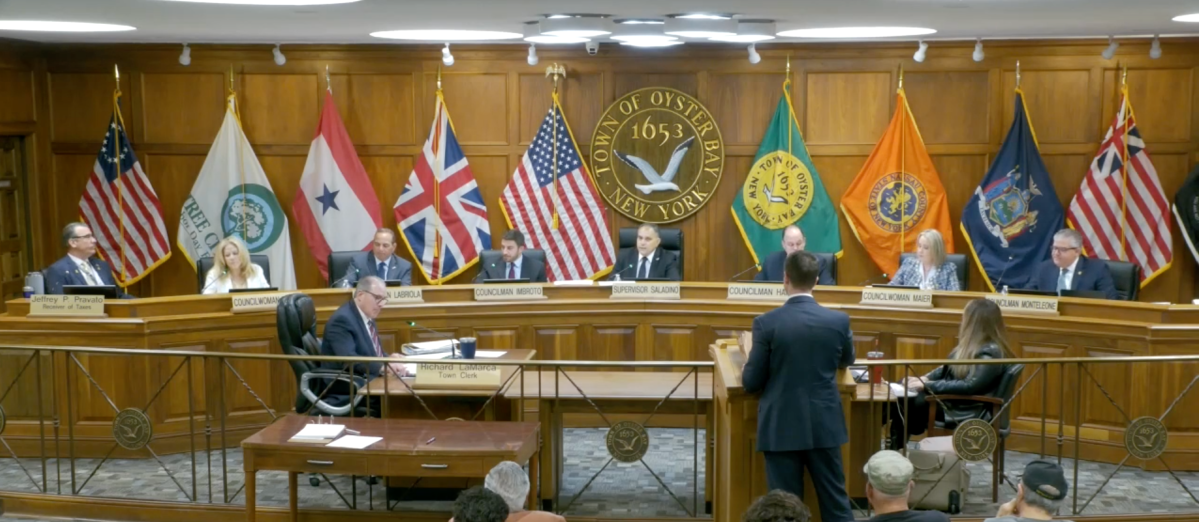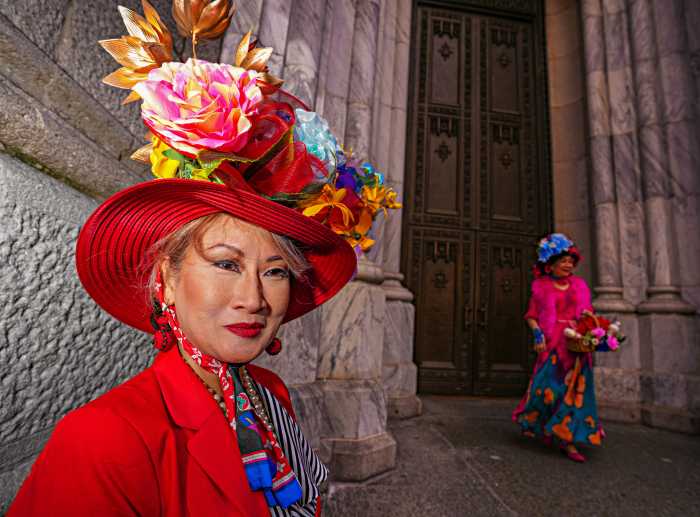Caribbean American Congresswoman Yvette D. Clarke has urged the Caribbean community in New York to vigorously “push back and fight back” on United States President Donald Trump’s immigration policies.
In addressing a town hall meeting Wednesday evening at the New Life Tabernacle in the heart of the Caribbean community in East Flatbush, Brooklyn, Clarke said there was dire need for the community to “push back and fight back in the best interest of our own self-preservation.”
“Donald Trump has been in office for fewer than 100 days, and he has been true to form,” said Clarke, representative for the 9th Congressional District in Brooklyn. “His administration has already undermined the broader international community’s confidence in our nation; threatened millions of American families with forced separation, through cruel and inhumane deportation practices; and initiated the process of eliminating programs that are critical to our health and safety.
“Let’s be clear, we are called to defend our community from the threat of a man whose very defining principle has been the denial of our own civil rights,” added Clarke at the town hall meeting, flanked by, among others, attorneys Diane Lucas, Assistant Attorney General for Civil Rights in the Office of New York State Attorney General, and Sam Palmer-Simon, Supervising Attorney for the New York-based Immigrant Justice Corp.
“We are at the center of his [Trump’s] disruption,” continued Clarke at the town hall meeting attended by her Jamaican-born parents, Leslie and Una Clarke. Una Clarke was the first Caribbean-born woman to be elected to New York City Council.
“We are being targeted for divestment, detention and deportation,” the congresswoman said. “With his policies on immigration, Donald Trump has attempted to return our nation to the worst parts of its history, when there were severe restrictions preventing Caribbean people and people of color generally from entering the United States, as well as ramped up, expanded and expedited deportations, or ‘politely, removals, without access to due process.
“Can you say deportation force,” she asked. “Well, it’s real. I’m not sugar-coating it, and I’m not exaggerating. This is real talk.”
Since Trump’s inauguration on Jan. 20, 2017, the congresswoman said “dozens, if not hundreds, of people in New York City have been detained by ICE [Immigration and Customs Enforcement] agents.
“Often times, they have been deprived of their rights and available leniency, relief or pardon,” she said. “These recent events, done under the sole authority of the Donald, have terrorized our community of law-abiding, hard-working immigrants, prompting countless people to panic – often after receiving false information and rumors about ICE raids, policies and procedures.”
Clarke warned that this “uncertain climate created by the Trump administration has allowed scam artists and other criminally-minded individuals to take advantage of people,”
But she urged members of the Caribbean community to know their rights, stating that, while ICE agents sometimes wear “street clothes, they cannot ask people for money.
“With your help, we will better inform the people of Central Brooklyn about their rights and fight back on a grassroots level against Donald Trump’s atrocious, racist, and xenophobic and white supremacist policies,” Clarke said.
In the interim, she said she will continue to fight against Trump’s immigration policies, stating that she has already introduced a bill in the US House of Representatives that would require ICE agents to wear body cameras during all enforcement activities.
She has also calling on the US Department of Homeland Security, successfully, to investigate civil rights abuses in the implementation of Trump’s executive orders on immigration.
Additionally, Clarke said staffers in her District Office in Brooklyn have been working “tirelessly” with immigrants, “who have immigration issues, assisting them by conducting inquiries into their citizenship and green card applications, as well as providing referrals to quality pro bono legal service organizations that assist with certain immigration matters.
“Let’s be vigilant and wise,” she urged. “I want to encourage anyone here or who you know, who has a green card and has been living in the United States continuously for the past five years to apply and become citizens. Join us in the ranks of US citizens who are on the front line to protect the most vulnerable among us.”
Meantime, as the Trump administration seeks to quickly find jail space for its increased crackdown on illegal Caribbean and other immigrants, it is also moving to curtail protections for these detainees, according to reports here.
For more than 15 years, jails that hold Caribbean and other immigrants facing deportation have had to follow a growing list of requirements, including notifying immigration officials if a detainee spends two weeks or longer in solitary confinement and informing detainees how to obtain medical care.
But new jail contracts will contain far less detailed set of regulations, according to the New York Times, stating that new contracts will require that jails maintain policies for suicide prevention, solitary confinement and other concerns, but will not specify what those policies should contain.
“The changes, which will coincide with the closing of an office that develops regulations, will essentially hold these jails to the same standards they must follow for criminal inmates,” said the Times on Friday. “That is a break from a long-held philosophy that people held on immigration violations, who are considered by law to be ‘civil’ detainees, should be treated differently, and is in line with the president’s belief that the government should be tougher on unauthorized immigrants.”
The paper said the moves also underscore the challenges of rapidly expanding immigration enforcement, a centerpiece of Trump’s campaign platform.
The Times noted that an internal memo, first reported by The Washington Post, revealed that the ICE agency has procured an additional 1,100 detention beds, which are not yet being used, and has identified 27 potential facilities with space for 21,000 detainees.
Though policy makers have long wanted to reduce the reliance on local jails, the Trump administration will use them more frequently, at least in the short term, because of the time it takes to build new detention centers designed for immigrants, said the Times, referring to information obtained from two unidentified officials at the US Department of Homeland Security.
Sarah Rodriguez, ICE’s acting deputy press secretary, said the agency was “in the midst of examining a variety of detention models to determine which models would best meet anticipated detention needs.”
























